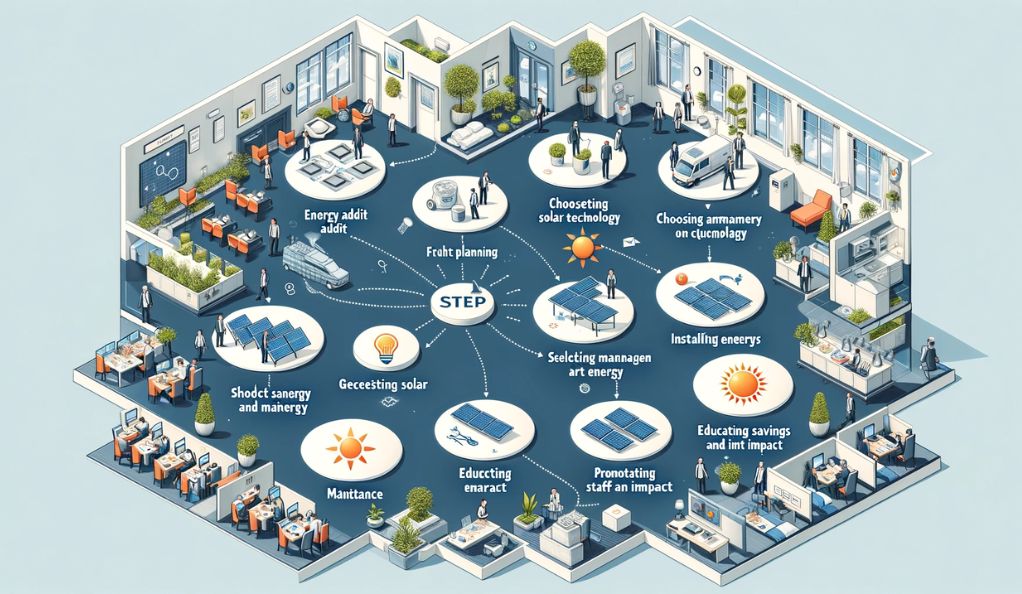Introduction to Solar Energy in Hospitality
The hospitality industry, globally renowned for its dynamic and consumer-centric nature, is at a pivotal juncture where sustainability is not just a choice, but a necessity. Amidst growing environmental concerns and escalating energy costs, solar energy emerges as a beacon of hope and innovation. This section delves into the transformative journey of the hospitality sector as it embraces solar energy, highlighting its increasing relevance, multifaceted benefits, and the fundamental shift it represents in the industry’s approach to sustainable business practices.

The Rise of Renewable Energy in Hospitality
The past decade has witnessed a paradigm shift in the hospitality industry’s energy consumption patterns, with a significant tilt towards renewable sources. Solar energy, in particular, has seen a meteoric rise, driven by its dual promise of environmental stewardship and economic prudence. Hotels, resorts, and other hospitality establishments are increasingly recognizing solar power as an indispensable tool in their sustainability arsenal. This transition is propelled by a combination of factors including technological advancements, decreasing costs of solar installations, and a global push towards reducing carbon emissions.
Solar Energy: A Sustainable Powerhouse
Solar energy stands out as a clean, inexhaustible, and increasingly cost-effective energy source. Unlike traditional fossil fuels, it generates electricity without emitting greenhouse gases, making it a cornerstone in the fight against climate change. This is particularly pertinent for the hospitality industry, which is both energy-intensive and acutely aware of its environmental footprint. By adopting solar power, hotels can significantly lower their carbon emissions, aligning with global sustainability goals and catering to the growing eco-consciousness of travelers.
Economic Incentives and Cost Savings
The economic argument for solar energy in hospitality is equally compelling. The past few years have seen a substantial decrease in the cost of solar hardware, making solar installations more affordable and accessible for businesses. Additionally, various government incentives, such as tax credits and rebates, further reduce the financial barriers to solar adoption. For hospitality businesses, this translates into lower operational costs, improved energy efficiency, and an attractive return on investment.
Brand Image and Consumer Demand
Incorporating solar energy also serves as a powerful marketing tool for hospitality businesses. Modern travelers are increasingly drawn to eco-friendly and sustainable lodging options. By integrating solar power, hotels can enhance their brand image, demonstrating a commitment to sustainability that resonates with the values of their guests.
Environmental Impact and Sustainability
Harnessing the Power of the Sun: A Green Leap Forward
The environmental impact of the hospitality industry has long been a topic of discussion and concern. With the integration of solar energy, the sector is making significant strides towards sustainability, redefining its interaction with the environment. This section explores the profound environmental benefits of adopting solar energy in hospitality, highlighting its role in reducing carbon footprints and fostering a more sustainable future.
Carbon Footprint Reduction: A Key to Climate Change Mitigation
One of the most compelling environmental benefits of solar energy in hospitality is the substantial reduction in carbon emissions. Traditional energy sources in the hospitality sector, primarily fossil fuels, are significant contributors to greenhouse gas emissions. Solar power, by contrast, produces electricity without burning fossil fuels, thereby reducing the emission of carbon dioxide and other harmful gases.
A practical example of this reduction can be illustrated through a comparative analysis:
- Traditional Energy Source: A hotel consuming 1,000 MWh/year from fossil fuels emits approximately 680 metric tons of CO2 annually.
- Solar Energy: The same hotel, using solar power for the same amount of energy, could reduce its carbon emissions to virtually zero.
Enhancing Biodiversity and Reducing Environmental Degradation
In addition to mitigating climate change, solar energy use in the hospitality industry contributes to the preservation of biodiversity. By reducing dependence on fossil fuels, the industry can minimize its impact on natural habitats and ecosystems, often disrupted by traditional energy extraction and consumption methods.
Technological Advancements in Solar Energy
The hospitality industry’s shift towards solar energy is not just a trend, but a response to the rapid advancements in solar technology. These technological innovations have made solar power more efficient, reliable, and adaptable to various hospitality needs. This section highlights key technological advancements in solar energy and how they are shaping the future of sustainable hospitality.

Evolution of Photovoltaic Panels
Photovoltaic (PV) technology, the cornerstone of solar energy systems, has undergone significant evolution. Modern solar panels are not only more efficient in converting sunlight into electricity but also more aesthetically pleasing, an important consideration for the hospitality industry. The latest PV panels offer higher energy conversion rates, meaning hotels can generate more power with fewer panels, optimizing both space and energy production.
Advancements in Energy Storage
Energy storage is a critical component of solar power systems, especially for the hospitality sector, which requires a consistent energy supply. The development of advanced battery technologies, like lithium-ion and solid-state batteries, has enhanced the efficiency and lifespan of energy storage systems. These advancements allow hotels to store surplus energy generated during peak sunlight hours and use it during periods of low sunlight or high demand, ensuring a reliable power supply around the clock.
Solar Integration with Smart Building Systems
The integration of solar power with smart building technology is a game-changer for the hospitality industry. Advanced monitoring and control systems enable hotel operators to manage energy consumption more effectively. These systems provide real-time data on energy production and usage, allowing for proactive adjustments to improve efficiency. Additionally, smart solar systems can be integrated with other hotel operations, such as HVAC and lighting, for comprehensive energy management.
Innovative Solar Applications
Solar technology is not limited to rooftop installations. Innovations like solar carports, solar windows, and even solar-powered outdoor lighting are expanding the ways hotels can harness solar energy. These applications offer multifunctional benefits – for instance, solar carports provide shade and generate power, while solar windows can reduce heating costs and generate electricity.
Government Incentives and Policies
The expansion of solar energy in the hospitality industry is significantly influenced by government incentives and supportive policies. These incentives not only make the transition to solar power more financially feasible for hotels but also underscore the commitment of governments worldwide to renewable energy and sustainable practices.
Federal and State Incentives
In many countries, governments offer a range of incentives to encourage the adoption of solar energy. These include tax credits, rebates, and grants. For instance, the United States Federal Investment Tax Credit (ITC) allows businesses to deduct a portion of their solar installation costs from their federal taxes. Such incentives significantly lower the initial investment required for solar installations, accelerating their adoption in the hospitality sector.
Feed-in Tariffs and Net Metering
Feed-in tariffs and net metering policies are other key drivers of solar energy adoption. Feed-in tariffs allow businesses to sell excess solar energy back to the grid at a favorable rate, creating an additional revenue stream. Net metering, on the other hand, allows for the offsetting of energy consumption with the energy generated, effectively reducing utility bills. These policies not only provide financial benefits but also enhance the appeal of solar energy as a viable and profitable investment for hotels.
Regional and Local Support
Local and regional authorities often provide additional support for solar energy projects. This support can take various forms, such as streamlined permitting processes, local grants, or specific incentives for renewable energy projects. Such localized support is crucial in addressing the unique needs and challenges faced by hotels in different regions, facilitating a smoother transition to solar energy.
Steps to Implementing Solar Energy in Hospitality Businesses
Implementing solar energy in the hospitality industry requires a strategic approach, ensuring that the transition is both effective and aligned with business objectives.
- Conducting an Energy Audit: The first step in this process involves conducting an energy audit. This assessment helps hotels understand their energy consumption patterns and identify the most efficient ways to integrate solar power.
- Planning for Renewable Energy Implementation: Following the audit, the development of a comprehensive renewable energy plan is crucial. This plan should consider the hotel’s energy needs, budget, and goals, outlining a clear roadmap for solar energy adoption.
- Navigating Installation and Permits: The installation process involves selecting the right solar technology and working with experienced professionals. Obtaining the necessary permits and approvals from local authorities is also a key step in this process.
- Partnering with Renewable Energy Providers: Selecting a qualified renewable energy provider is essential for a successful solar energy project. This partnership should be based on expertise, reliability, and a track record of successful installations.
- Communicating the Change to Stakeholders: Finally, effective communication with guests and other stakeholders about the hotel’s renewable energy initiatives is important. This transparency not only enhances the hotel’s image but also encourages the adoption of sustainable practices within the wider community.
Conclusion
The integration of solar energy in the hospitality industry is a journey towards sustainability, economic efficiency, and innovation. Through careful planning, adoption of advanced technologies, and leveraging government incentives, hotels can effectively transition to solar energy. The success stories of hotels around the world serve as inspiration and a testament to the positive impact of solar energy in this sector. As the industry continues to evolve, solar power will play an increasingly vital role in shaping a sustainable and prosperous future for hospitality businesses.
